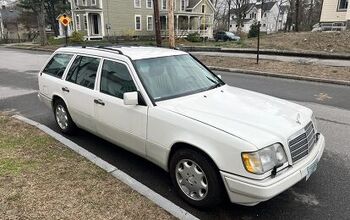RIP Paul Fussell: A Tribute To The Man Who Informed My Perceptions On Luxury Automobiles
A credit to my parents (among many); they turned everything into a “teachable moment”. A new addition to my vocabulary came with a lesson on the root word, and whether it came from Latin, or French or Greek. A new song came with a quick history of Manchester 80’s New Wave, or Delta blues. My allowance was paid after chores and before a lesson on budgeting. A new car magazine had to be read and not just scanned through for pretty pictures.
And so came one of the lessons that ended up changing how I viewed the world. I was in my early teens, and had just discovered Tom Wolfe’s Bonfire of the Vanities, when my father suggested I read Paul Fussell’s Class. “It’s even got some car stuff in there; he talks about how people buy SUVs to look like they’re rich enough to have a country home. Just read it. You’ll like it.”
I devoured Class, as well as Bad, which I considered the advanced, up-to-date version, and never looked at the world in the same way. Not many books have done that. To explain both would take another essay entirely, but both books do a wonderful job of deconstructing consumerism, advertising, marketing and most importantly, how all three prey on people’s insecurities relating to social status. Read them and you will feel both immune to “aspirational brand” marketing and also wondering about the class signals given off by friends, peers, people you interact with – and yourself.
Paul Fussell died today at age 88, and while his body of work is incredibly important in an era where class and money no longer have anything to do with one another, and the push to define ourselves through consuming goods has never been stronger. I leave you with the passage below, from Class, where Fussell ruthlessly dissects the semiotics of the automobile (and also perhaps, shows some indirect Panther love – remember, this book was written in the early/mid-80s)
“If your money and freedom and carelessness of censure allow you to buy any kind of car, you provide yourself with the meanest and most common to indicate that you`re not taking seriously so easily purchasable and thus vulgar a class totem. You have a Chevy, Ford, Plymouth or Dodge, and in the least interesting style and color. It may be clean, although slightly dirty is best.
You may not have a Rolls, Cadillac or a Mercedes. . . . The worst kind of upper-middle-class types own a Mercedes, just as the best own elderly Oldsmobiles, Buicks and Chryslers, and perhaps Jeeps and Land Rovers, the latter conveying the preppy suggestion that one of your residences is in a place so unpublic that the roads to it are not even paved, indeed are hardly passable by your ordinary vulgar automobile.”
And of course, some wisdom from my own mother, upon seeing the first $399/month lease deal for a BMW 320i
“Anyone can have a BMW now…and [redacted, her billionaire godfather] drives an old, beat up Buick.”
Two teachable moments, expressed in slightly different ways, updated for our times. Go out and buy the books. For the cost of a couple spark plugs, your outlook on the world will never be the same.
More by Derek Kreindler
Latest Car Reviews
Read moreLatest Product Reviews
Read moreRecent Comments
- Yuda I'd love to see what Hennessy does with this one GAWD
- Lorenzo I just noticed the 1954 Ford Customline V8 has the same exterior dimensions, but better legroom, shoulder room, hip room, a V8 engine, and a trunk lid. It sold, with Fordomatic, for $21,500, inflation adjusted.
- Lorenzo They won't be sold just in Beverly Hills - there's a Nieman-Marcus in nearly every big city. When they're finally junked, the transfer case will be first to be salvaged, since it'll be unused.
- Ltcmgm78 Just what we need to do: add more EVs that require a charging station! We own a Volt. We charge at home. We bought the Volt off-lease. We're retired and can do all our daily errands without burning any gasoline. For us this works, but we no longer have a work commute.
- Michael S6 Given the choice between the Hornet R/T and the Alfa, I'd pick an Uber.


































Comments
Join the conversation
I know I'm going to get crap for this (and I realize I'm stretching the classical sense of the term somewhat), but if we think of class as marking various kinds of value hierarchies among social groups, then I think the clearest example of a 'class' distinction in the U.S. (and I would include parts of Canada in this), is along racial lines. The historical differences in the way people are regarded, treated, and so on, and the advantages, disadvantages of belonging to one racial group vs. another (and I'm speaking of multiple groups here, not just two), is still very palpable. One could argue as well that there's one along gender lines, but that's another can of worms. Other kinds of classes exist as well, but as other posters have pointed out, many of these tend to be constantly shifting and hence less 'enduring' than the kinds of class distinctions one might find in Europe. That doesn't make them any less real, only less 'traditional' when compared to the European notion of 'class.' I'd say a good indicator of class distinctions is social mobility. Wherever social mobility is restricted or constrained in ways the make it difficult for a person from one group to enter into another, then you have something akin to a class distinction (as a general rule, now, not as a strict one).
I haven't read the book, but I'd already gotten the lesson. I'd been told in the early '80s that the rich drove Chevys and the well to do drove ten year old Chryslers. My father (born in 1907) told me that in the late '40s, it was Chevys/Fords for the rich, ten year old Packards for the well-to-do. My dad remembers the early '30s before FDR when the rich didn't drive - they were chauffeured in Pierce-Arrows, and the well to do drove three year old Nashes. The pattern remains, only the models change.